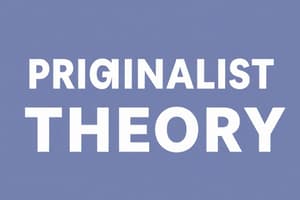Podcast
Questions and Answers
Organizations are solely defined by their distinct purpose and do not require people to function.
Organizations are solely defined by their distinct purpose and do not require people to function.
False (B)
A firm transforms lower-value inputs into higher-value outputs to maximize profit.
A firm transforms lower-value inputs into higher-value outputs to maximize profit.
True (A)
Neoclassical theory of the firm treats the firm as a transparent entity that reveals its inner workings.
Neoclassical theory of the firm treats the firm as a transparent entity that reveals its inner workings.
False (B)
Transaction costs theory implies that firms exist because markets operate efficiently with no associated costs.
Transaction costs theory implies that firms exist because markets operate efficiently with no associated costs.
The agency problem arises when the interests of the principal and the agent are aligned.
The agency problem arises when the interests of the principal and the agent are aligned.
A firm plays a key role in promoting inclusive growth by addressing unemployment.
A firm plays a key role in promoting inclusive growth by addressing unemployment.
The market is viewed as an 'invisible hand' that eliminates the need for firms.
The market is viewed as an 'invisible hand' that eliminates the need for firms.
In agency theory, all parties involved have the same roles and responsibilities regardless of their position.
In agency theory, all parties involved have the same roles and responsibilities regardless of their position.
A firm can achieve sustained competitive advantage if its resources are valuable, rare, easy to imitate, and substitutable.
A firm can achieve sustained competitive advantage if its resources are valuable, rare, easy to imitate, and substitutable.
An intrapreneur is a person who starts a new business independent of an existing organization.
An intrapreneur is a person who starts a new business independent of an existing organization.
Service firms include hotels, catering firms, and financial institutions.
Service firms include hotels, catering firms, and financial institutions.
Ownership and management are always combined in large companies.
Ownership and management are always combined in large companies.
A family-owned firm is managed entirely by family members without any external influence.
A family-owned firm is managed entirely by family members without any external influence.
The main focus of corporate governance is to encourage conflicts of interest between owners and managers.
The main focus of corporate governance is to encourage conflicts of interest between owners and managers.
A business plan outlines how an entrepreneur will exploit a business opportunity.
A business plan outlines how an entrepreneur will exploit a business opportunity.
State-owned firms are owned and controlled by private individuals.
State-owned firms are owned and controlled by private individuals.
A manager entrepreneur primarily focuses on innovating new products.
A manager entrepreneur primarily focuses on innovating new products.
A micro-enterprise is defined by its small size and is typically owned by a single individual.
A micro-enterprise is defined by its small size and is typically owned by a single individual.
Creativity and originality are not necessary characteristics of an entrepreneur.
Creativity and originality are not necessary characteristics of an entrepreneur.
A commercial firm is defined exclusively as a retail company.
A commercial firm is defined exclusively as a retail company.
The resource-based view suggests that a firm is a unique bundle of market trends.
The resource-based view suggests that a firm is a unique bundle of market trends.
The risk-taking entrepreneur innovates by evaluating and exploiting business opportunities.
The risk-taking entrepreneur innovates by evaluating and exploiting business opportunities.
Flashcards
Organization
Organization
A social entity composed of people working together to achieve a specific purpose with a deliberate structure for task assignment and responsibility.
Firm
Firm
A profit-seeking organization that transforms lower-value inputs into higher-value outputs to satisfy customer needs.
Firm's Environment
Firm's Environment
The idea that firms are influenced by external factors like regulations, competition, and economic conditions.
Firm as an Economic Reality
Firm as an Economic Reality
Signup and view all the flashcards
Firm as a Social Reality
Firm as a Social Reality
Signup and view all the flashcards
Neoclassical Theory of the Firm
Neoclassical Theory of the Firm
Signup and view all the flashcards
Transaction Costs Theory
Transaction Costs Theory
Signup and view all the flashcards
Agency Theory
Agency Theory
Signup and view all the flashcards
Firm Owner
Firm Owner
Signup and view all the flashcards
Resources & Capabilities
Resources & Capabilities
Signup and view all the flashcards
Competitive Advantage
Competitive Advantage
Signup and view all the flashcards
Principal-Agent Problem
Principal-Agent Problem
Signup and view all the flashcards
Agency Cost
Agency Cost
Signup and view all the flashcards
Corporate Governance
Corporate Governance
Signup and view all the flashcards
Intrapreneur
Intrapreneur
Signup and view all the flashcards
Business Plan
Business Plan
Signup and view all the flashcards
Launching an Entrepreneurial Start-up
Launching an Entrepreneurial Start-up
Signup and view all the flashcards
Entrepreneurship
Entrepreneurship
Signup and view all the flashcards
Entrepreneur
Entrepreneur
Signup and view all the flashcards
Innovation
Innovation
Signup and view all the flashcards
Tolerance of Ambiguity and Uncertainty
Tolerance of Ambiguity and Uncertainty
Signup and view all the flashcards
Internal Locus of Control
Internal Locus of Control
Signup and view all the flashcards
Study Notes
Nature of the Firm
- Firms are profit-seeking organizations, satisfying customer needs by transforming inputs into outputs.
- They operate within an environment and play a role in inclusive economic growth by mitigating inequality.
- Key characteristics of an organization: distinct purpose, people, and deliberate structure.
Theoretical Approaches to the Firm
- Neoclassical theory: Views the firm as a "black box" maximizing profit, focusing on factor and product markets with the market as a coordinating force.
- Transaction costs theory: Explains firms' existence as a result of market inefficiencies due to various transaction costs (information, negotiation, monitoring, enforcement).
- Agency theory: Focuses on contracts between principals and agents within the firm, aiming to align interests and reduce agency costs.
- Resource-based view (RBV): Emphasizes a firm's unique bundle of resources and capabilities for sustained competitive advantage. Resources must be valuable, rare, inimitable, and non-substitutable.
Classifying Firms
- Ownership: State-owned, mixed equity, privately-owned.
- Size: Micro-enterprises, small, medium, large.
- Nature of activity: Industrial (extractive, manufacturing), commercial (wholesale, retail), service (personal, transport, financial).
- Scope/location: Local, domestic, international.
- Legal form: Sole proprietorship, partnership, corporation, cooperative.
Ownership and Management
- Firm owners can be entrepreneurs (creating and managing) or investors (hiring managers).
- Large firms often separate ownership and management, with shareholders electing a board to hire corporate officers.
- Corporate governance aims to mitigate conflicts between owners and managers.
Entrepreneurship
- Entrepreneurs recognize business opportunities and secure resources to start a venture, bearing risks.
- Intrapreneurs implement innovations within existing firms.
- Key entrepreneur characteristics include creativity, action orientation, initiative, risk tolerance, learning, autonomy, and leadership.
- Entrepreneurship involves developing a business idea, creating a business plan, and establishing the firm legally (choosing legal form, registration, licenses/permits, etc).
- Business plans outline business objectives, market analysis, marketing strategies, production plans, location, organizational structure, funding sources, and legal aspects.
Types of Firms
- Defined by the nature of their production activity, scale (scope), and location (local, domestic, international).
- Different legal frameworks (sole proprietorship, partnership, corporation, cooperative) shape the operational structures of firms.
Studying That Suits You
Use AI to generate personalized quizzes and flashcards to suit your learning preferences.



